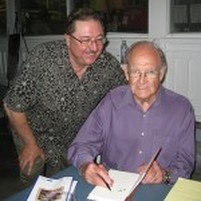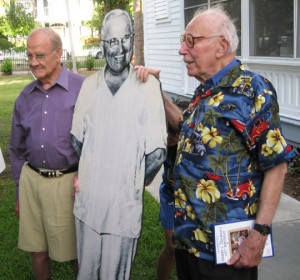|
by Ray Smock George McGovern died on October 21 at the age of 90. Those of us who remember the presidential election of 1972, forty years ago, recall that McGovern lost that election in the worst defeat in presidential history. He lost the popular vote by 18 million votes and lost to Richard Nixon in the Electoral Vote by 520 to 17. I voted for him and was in that minority of 29 million of Americans who hoped his election would hasten the end of the long war in Vietnam. The last time I saw Senator McGovern was in May 2009. He was the featured speaker at a conference on President Harry Truman, held at Truman’s “Little White House,” in Key West, Florida. He had just written a very nice short, interpretive biography of Abraham Lincoln and he spoke to the conference on Lincoln. In Key West, the dress is casual, and McGovern showed up in Bermuda shorts, but wore a purple dress shirt, open at the collar, and dress shoes and socks. It was about as formal looking as you could get while wearing shorts. Ken Hechler, former Congressman from West Virginia, was at the conference too. Hechler, at age 95, was one of the last living members of President Truman’s staff. McGovern and Hechler had a grand time reminiscing.  McGovern autographs his biography of Lincoln for Ray Smock. McGovern autographs his biography of Lincoln for Ray Smock. When I went up to the table to get McGovern’s autograph on his book, I said “Senator McGovern, I was proud to vote for you in 1972 and have never regretted that vote.” He laughed and said “You know, if everyone over the years who told me they voted for me actually did vote for me I would have won in a landslide rather than losing in a landslide.” Then he got serious and actually thanked me for my vote. Senator McGovern and Senator Byrd started out in support of the Vietnam War, both voting for the Gulf of Tonkin resolution in 1964. But McGovern would be among the first national figures to break with President Lyndon Johnson, saying on the floor of the Senate, “I’m tired of old men dreaming up wars for young men to fight.” Senator Byrd supported the war longer and more vociferously, calling war protesters like me “hypocritical, self-centered, selfish, long hair, know-it-all students and pseudo-intellectuals.” I was a long-haired graduate student in American history at the time. Byrd’s words seemed to describe me pretty well. Not that I totally agreed with his assessment! After the Tet Offensive in 1968, Senator Byrd became more critical of the conduct of the war and eventually concluded that we had entered the war under false pretenses and that despite military reports of battlefield successes and body counts of enemy dead, that the United States military and its commander-in-chief were misleading the Senate and the nation regarding the realities in Vietnam. The Viet Cong were much stronger and more resilient than the president and his generals were willing to admit. In 1971, when President Nixon considered nominating Senator Byrd for a seat on the Supreme Court, presidential candidate George McGovern echoed the sentiment, saying he agreed that Byrd was a “man of enormous industry and personal pride” and that if Byrd got the nomination he would “bend every effort to become a great justice.” Days later McGovern changed his mind and said that Byrd’s nomination to the high court would be “highly divisive.” Among Senator Byrd’s prized possessions, which he framed and hung on the wall of his Senate office, was a letter he received from George McGovern in 1994. It is a one-page, handwritten letter that McGovern wrote on Best Western hotel stationery while he was visiting his daughter in Wisconsin. McGovern praised Senator Byrd for his fight against the line-item veto and his “statesmanlike speech against the Clarence Thomas nomination” to the Supreme Court. The final paragraph of the letter, dated March 6, 1994, reads: I once suggested on national television in 1972 that you would be one of the people I would be thinking about, if I were elected President, as a nominee for the Supreme Court. Some of my liberal friends jumped all over me at the time, but with the passage of time, I’m all the more certain that was a perceptive idea. You are a man of strong character and a wise student of constitutional government. It was my good fortune to have served with you for 18 years in the U.S. Senate. I remember another time, in 1997, when, by mere coincidence, I was standing in line at a White House security check-point next to George McGovern and former Senator Charles “Mac” Mathias. We were all headed to the Indian Treaty Room, where there was a reception for former Congresswoman Lindy Boggs, who President Clinton had just named as Ambassador to the Vatican. The two former senators were in animated conversation about the politics of the day, and they graciously included me and my wife Phyllis in their conversation. When it came time for George McGovern to have his name checked off the guest list and pass through the magnetometer, a young woman on the White House staff looked up at him, asked him his name so she could check it off the list, and then asked, “how do you spell that?” Senator McGovern was very polite and in a clear voice said, McGovern, M-c-G-O-V-E-R-N.” I was aghast. Here was a former U.S. Senator, a candidate for President of the United States seeking entrance to a White House reception, and the White House protocol people did not have anyone on duty that could screen these two senators through security. I looked around at the uniformed guards and at the woman checking the guest list. They were so young that they were probably not even born, or were in diapers, when George McGovern ran for president. They did not know who he was.
While I was appalled by the White House staff’s lack of protocol and etiquette in the handling of both senators, the lesson I came away with was how graciously McGovern and Mathias took this. The guards and the social staff at the White House did not know enough history to act differently—and the senators did not expect them to act differently. Nobody in the line that evening knew this better than former World War II bomber pilot, U.S. Senator, presidential candidate, and just plain good citizen, George McGovern. Comments are closed.
|
Welcome to the Byrd Center Blog! We share content here including research from our archival collections, articles from our director, and information on upcoming events.
Categories
All
Archives
July 2023
|
Our Mission: |
The Byrd Center advances representative democracy by promoting a better understanding of the United States Congress and the Constitution through programs and research that engage citizens.
|
Copyright © Robert C. Byrd Center for Congressional History and Education
|


 RSS Feed
RSS Feed
